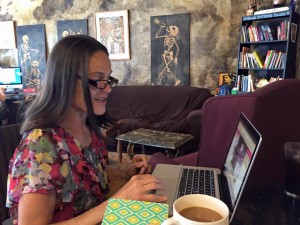It’s summer, and one of the tasks I undertake is retyping the list of usernames and passwords for all the online places I frequent. I update twice a year now…and today is the day! I have added so many new “tools” and communities. Do I need to access yet another? It depends on what I want to learn, so perhaps. Is it possible, however, that I have yet to fully explore communities to which I already belong, that within this trove I’ve cached, there lie the resources that could help me with my multimedia montage project (MMP)? “Yes!” is the resounding answer.
I have joined our class community on google+ and added Teachercast Educational Broadcasting and PBL (Project-Based Learning) as well. Then I scour my go-to places list to find that Pinterest has edudemic with a collection specifically devoted to web-design that looks promising for a newbie like me. In addition, edweb, a familiar landscape, has amazing resources in communities such as “Game-Based Learning” and “Creating Multimedia Stories” that I might never have discovered were it not required that I go looking.
The course I will be finishing in the next two weeks, “Introduction to Teaching with Digital Tools,” has familiarized me with ADDIE to a degree. Today, as I was looking at LDC.org, I realize that the way the design of lessons is outlined follows the principles of Analysis, Design, Development, Implementation, and Evaluation in a simplified form. Now I am seeing design principles everywhere. (This morning my yoga teacher had asked, “Has anyone ever had the experience of watching a movie for the 10th time and seeing or hearing something for the first time? You were at a different place the other nine times…Now you are here!”) And so I am!
Because I intend the audience for the MMP to be my seventh and eighth grade book clubs, and envision going through the steps with the model text that they will be going through, all of Jeff Bradbury’s help, particularly technical, will be invaluable. I want to have my students using the skills that they already use in their extra-curricular lives (Walker, Jameson & Ryan as cited in Sharpe, Beetham & de Frietas, 2010, p. 213) in the structure of our learning environment.
The book clubs will be addressing the essential question,”What Is Justice?” through their study of different texts. (I see “driving” question on the PBL site, and think they may be similar, but am too ignorant yet to answer definitively.) The texts they will choose from, predominantly novels, explore different responses to injustice. Their “Take-Away” projects are what I want to address through the MMP. The website will display the work of the students and allow them the freedom of presentation options, the how. To a large extent, they will also select the content, what they choose to examine. As Walker, Jameson, and Ryan asserted, “There is significant value in learners bringing to their academic studies these habits of selecting and appropriating materials, seeing and creating new patterns of meaning, and sharing information in creative ways” (as cited in Sharpe et al. p. 217). The students will be building understanding, not just for themselves, but to share with the larger community, those who did not read the same text. Furthermore, the essential question is being used across the eighth grade disciplines throughout the year. Hopefully the work, and the methodology, regardless of the class in which it happens, will transfer. I know I will be teaching for that.
